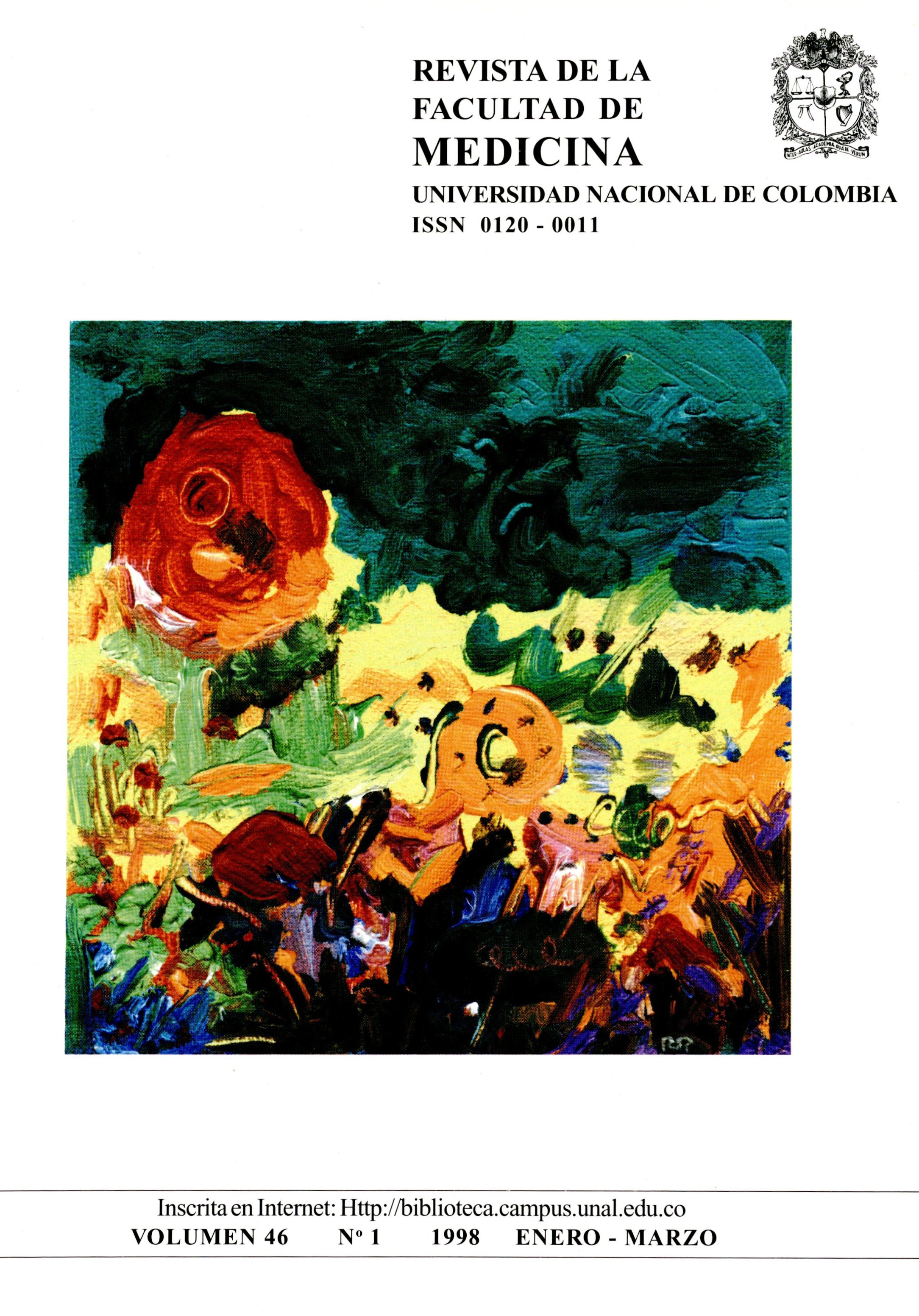Enfermedad tiroidea autoimnune en pacientes con bocio y/o hipotiroidismo
Keywords:
enfermedad tiroidea, hipotiroidismo (es)Downloads
Objetivos: Determinar la presencia de anticuerpos antitiroideos en pacientes con hipofunción tiroidea subclínica o franca con o sin bocio. Materiales: Se estudiaron 59 pacientes que presentaban bocio, y/o hipofunción tiroidea dada por una TSH sérica basal mayor de 5.0 mU/L, con hormonas tiroideas normales: Hipotiroidismo Subclínico; o con niveles subnormales de hormonas tiroideas: Hipotiroidismo franco. Resultados: EI grupo con mayor porcentaje de pacientes con 40.70% fue el de bocio
hipofuncionante, seguido por el de bocio eutiroideo con 32.20%, 27.10% presentaban función sin bocio. De los 59 pacientes el 18.63% resultaron positivos para anti- TPO. Se demostraron anticuerpos anti-TPO) positivos en 5.26% del total de los pacientes con bocio eufuncionante,y en 41.66% con bocio hipofuncionante. AI analizar los pacientes con anticuerpos antiperoxidasa positivos se observa un predominio significativo de bocio e hipotiroidismo (90.90%), frente a 9.10% de pacientes con bocio eufuncionante. No se encontraron concentraciones de anticuerpos positives mayores de 100 UI/ml en los pacientes con Hipotiroidismo sin bocio. De los pacientes con bocio e hipofunción 41.70% fueron positivos para anticuerpos tiroideos y de estos 25% presentaba franca hipofunción tiroidea y 16.67% de los pacientes de esta categoría presentaban Hipotiroidismo Subclínico. Una paciente presentaba bocio sin compromiso de la función. Conclusiones: De acuerdo con nuestros resultados la TCA es una entidad frecuente como causa de hipofunción tiroidea en nuestros pacientes de la Unidad de Endocrinología. Por lo tanto consideramos que la investigación sobre la existencia de la TCA debe realizarse en estos pacientes presenten o no bocio, e igualmente en los que presentan hipotiroidismo subclínico, ya que una gran proporción de estos con anticuerpos positivos evolucionan hacia franco hipotiroidismo, por lo cual el tratamiento de esta entidad debe ser considerado.We studied the presence of antithyroid antibodies in subjects with slight to overt thyroid disfunction. Fifty nine subjects that showed goiter or TSH levels above 5.0 mU/L were included. The percentage of patients with positive anti Thyroid Peroxidase antibodies (anti TPO) was 18.63%. From them, 90.9% exhibited goiter along with thyroid dysfunction, whereas only 9.1 % had goiter without thyroid disfunction. There was no patient without goiter that showed anti TPO levels above 100 mUl/ mL.We conclude that thyroid autoimmune disease is very prevalent among our patients, so it must be suspected in subjects with or without goiter, as well as in those with slight thyroid disfunction, because it could progress to overt hypothyroidism.
How to Cite
APA
ACM
ACS
ABNT
Chicago
Harvard
IEEE
MLA
Turabian
Vancouver
Download Citation
Article abstract page views
Downloads
License
Copyright
Authors must agree to transfer to the Revista de la Facultad de Medicina the copyright of the articles published in the Journal. The publisher has the right to use, reproduce, transmit, distribute and publish the articles in any form. Authors will not be able to permit or authorize the use of their published paper without the written consent of the Journal.
The letter of copyright transfer and the letter of authorship responsibility must be submitted along with the original paper through the Journal OJS platform. These files are available in https://goo.gl/EfWPdX y https://goo.gl/6zztk4 and must be uploaded in step 4 (supplementary files).
Authors who publish with this journal agree to the following terms:
- Authors retain copyright and grant the journal right of first publication with the work simultaneously licensed under a Creative Commons Attribution License that allows others to share the work with an acknowledgement of the work's authorship and initial publication in this journal.
- Authors are able to enter into separate, additional contractual arrangements for the non-exclusive distribution of the journal's published version of the work (e.g., post it to an institutional repository or publish it in a book), with an acknowledgement of its initial publication in this journal.
- Authors are permitted and encouraged to post their work online (e.g., in institutional repositories or on their website) prior to and during the submission process, as it can lead to productive exchanges, as well as earlier and greater citation of published work (See The Effect of Open Access).





















